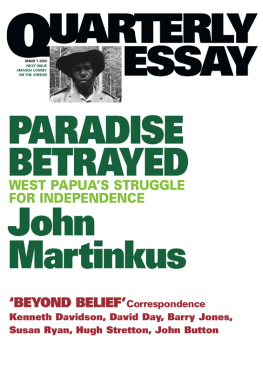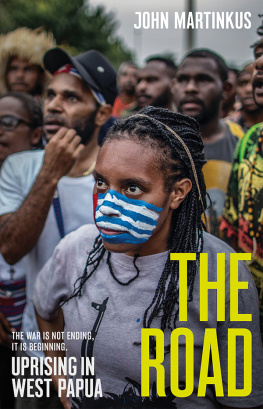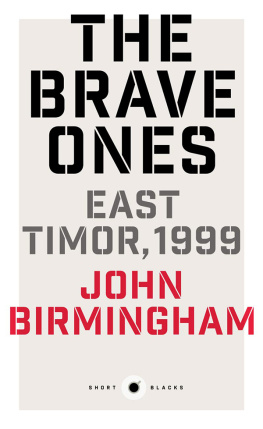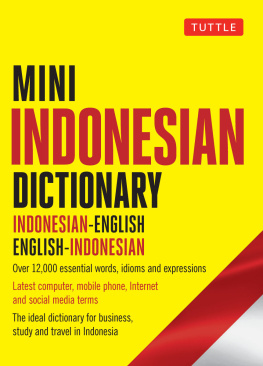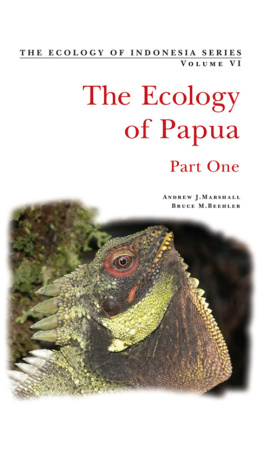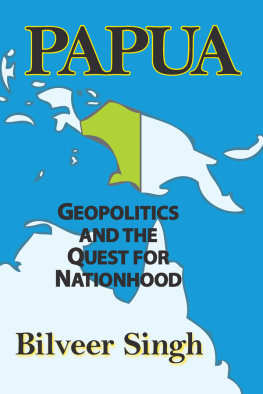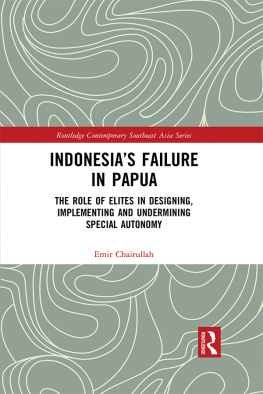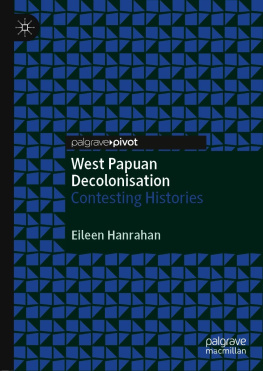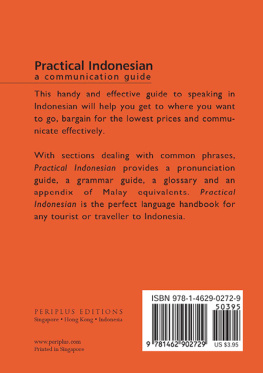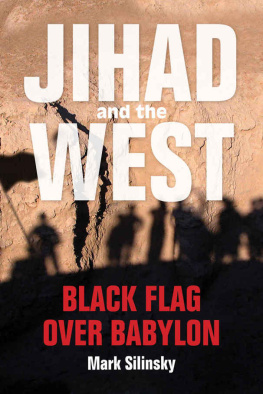Quarterly Essay
Quarterly Essay is published four times a year by Black Inc., an imprint of Schwartz Publishing Pty Ltd
Publisher: Morry Schwartz
ISBN 1 86395 163 6
Subscriptions (4 issues): $46.95 a year within Australia incl. GST (Institutional subs. $52.95). Outside Australia $74.95. Payment may be made by Mastercard,Visa or Bankcard, or by cheque made out to Schwartz Publishing. Payment includes postage and handling.
To subscribe, fill out and post the subscription form on the last page of this essay, or subscribe online at:
www.blackincbooks.com
Correspondence and subscriptions should be addressed to the Editor at:
Black Inc.
Level 5, 289 Flinders Lane
Melbourne VIC 3000 Australia
Phone: 61 3 9654 2000
Fax: 61 3 9654 2290
Email: quarterlyessay@blackincbooks.com
http://www.blackincbooks.com
Editor: Peter Craven
Management: Silvia Kwon
Managing Editor: Chris Feik
Production Coordinator: Sophy Williams
Publicity: Meredith Kelly
Design: Guy Mirabella
Printer: Griffin Press
Map of West Papua: John Waddingham
West Papua photos: John Martinkus
CONTENTS
Peter Craven
PARADISE BETRAYED
West Papuas Struggle for Independence
John Martinkus
Kenneth Davidson, David Day, Barry Jones, Susan Ryan,
Hugh Stretton, John Button
Quarterly Essay aims to present significant contributions to political, intellectual and cultural debate. It is a magazine in extended pamphlet form and by publishing in each issue a single writer at a length of at least 20,000 words we hope to mediate between the limitations of the newspaper column, where there is the danger that evidence and argument can be swallowed up by the form, and the kind of full-length study of a subject where the only readership is a necessarily specialised one. Quarterly Essay aims for the attention of the committed general reader. Although it is a periodical which wants subscribers, each number of the journal is the length of a short book because we want our writers to have the opportunity to speak to the broadest possible audience without condescension or populist shortcuts. Quarterly Essay wants to get away from the tyranny that space limits impose in contemporary journalism and we give our essayists the space to express the evidence for their views and those who disagree with them the chance to reply at whatever length is necessary. Quarterly Essay will not be confined to politics but is centrally concerned with it. We are not interested in occupying any particular point on the political map and we hope to bring our readership the widest range of political and cultural opinion which is compatible with truth-telling, style and command of the essay form.
In 1999 when John Howard went to the rescue of the people of East Timor, he finally brought Australian government policy in line with the feelings of the Australian people who had always taken the dimmest view of what the Indonesians had done to that poor brave put-upon country. And in the wake of the vote for independence when the militias backed by the brutality of the Indonesian military caused their wave of bloodshed and mayhem, middle-class mothers took to the streets of Sydney and Melbourne as they had not done since the height of the Vietnam War. They wanted an end to the killing, they wanted what Howard ultimately gave them, boots on the ground, for the sake of peace and the protection of life. They also wanted an end to twenty-five years of bipartisan Australian government hypocrisy.
In the new Quarterly Essay John Martinkus, who has written with such authority on East Timor, provides a path-breaking piece of extended reportage in which he shows that West Papua is another East Timor waiting to happen, that in fact it is happening with the collusion of Australia and American indifference and that the repression of the independence movement in West Papua is being effected by the very same Indonesian architects of bloodshed and oppression who produced the rape of East Timor.
John Martinkus is one of those foreign correspondents who risks his all to get the story, and Paradise Betrayed unfolds step by step as a riveting and disquieting narrative account of what it is like to visit what was almost a lost world before it encountered the Javanese will to power and denial of freedom.
He is absolutely level and absolutely convincing in the way he evokes the almost Australian familiarity of Vanimo with its takeaway food and its Rugby League on TV and then proceeds to hit the reader with the stomach-turning details of the torture and mutilation and carnage that has been inflicted on those who support the Papuan independence movement (the OPM as it is called) and raise the Morning Star flag that betokens their freedom. This is our back door, what should be our sphere of influence, on which the severed body parts fall.
It is a sobering and shocking story as Martinkus tells it and what stares through it is the dignity and simplicity of these warriors who have willed themselves to fight a cruel colonial regime in the face of little organisation or hope.
John Martinkus is lucid in his exposition of how the West Papuans were sold out to the Indonesians by US and Australian governments full of Cold War anxiety and he is scathing about the shibboleth of the Free Choice referendum and the current sop of autonomy which the Indonesians use to cover a regimen of exploitative cruelty.
We see the faces of the old men who worked for the UN and who saw their hopes drain into the sea just as we hear the story of Theys Eluay, the one figure around whom the independence movement clustered, who was murdered by the most feared unit of the Indonesian military machine, Kopassus. His far more temporising successor, Beanal, has seemed willing to do some kind of a deal with the Indonesians but even so there is little hope of mercy from a Jakartan government which has been bought off by the owners of the Freeport mine, one of the richest of its kind in the world and one whose commercial interests are safeguarded by Indonesian thuggery in a way that would sound like a Marxist caricature from the sixties if the sober Martinkus were not our informant.
This is a group portrait of people the world has chosen to forget, who have been offered next to nothing by an intimately familiar oppressor. The autonomy the Indonesians proffer to the people of what used to be called Irian Jaya has some small appeal to the elites of West Papua but it offers nothing to the people some of whose first contact with the outside world took the form of the hostile faces of the Indonesian soldiers. They hunger for the freedom the Indonesians deny them by killing their leaders.
Martinkus has a remarkable scene in which he depicts the US Ambassador, a man of apparently liberal feeling, indicating to people who are as oppressed by fear as they are by death (the two as linked as the gun and its discharge) that no, its not antagonism to the West Papuan people that governs policy, its the lure of what comes out of the mine. It is Freeport that sits like an emblem of globalised greed on this ancient landscape and it will be hard for any reader of John Martinkus Quarterly Essay not to see it as a sink of iniquity and an outright provocation. The fact that the West Papuans are capable of responding with explosive-tipped arrows does not stop the situation from being ghastly any more than the local colour that abounds in John Martinkus account, with its penis-gourd-adorned Dani people who whoop like sirens as they wave their spears, stops this story from being one of pity and terror.
The terror is manifest on the cowed faces of the burly students who witnessed the Indonesian reprisals in the incident at the Abepura police station, with the blood dripping down the walls, and it is there, almost uncannily, when we read of how the Indonesians have sponsored Laskar Jihad, a group of sword-wielding, cloak-wearing Islamic extremists who have been sent into the country to teach the Papuans whats what.
Next page
